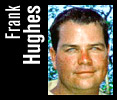 |
West's shrewd moves make him best GM By Frank Hughes Special to ESPN.com |
||||||||||||||||||
|
Here is a story that provides just one of the reasons that Jerry West is the best general manager/decision-maker in the NBA, according to a survey done by ESPN.com -- and the reason that the Memphis Grizzlies are eventually going to stop floudering and one day begin swimming upstream with the other big fish of the Western Conference. In his inaugural offseason as the Grizzlies' general manager, West took a look around the stark wasteland of 2002 summer free agency and he chose the Seattle SuperSonics as his team to pick on -- and pick from.
Watson, meanwhile, was feeling little love for the Sonics after coach Nate McMillan unwisely left him off the playoff roster in favor of veteran journeyman Randy Livingston. After he cleaned out his locker for the final time, Watson said the Sonics made it easy for him to explore free agency. From West's perspective, he didn't care which player he got, he just wanted one of them -- a young talent that the Grizzlies could develop into a very good player on a team with some decent pieces already in place. So West began negotiations with the agents for both players, and slowly but surely the Sonics could see themselves getting backed into the corner with a firing squad waiting for them. West offered James the Grizzlies' mid-level exception, knowing that, if the Sonics did not match their offer with their own mid-level exception, he would have himself a seven-footer with which to work. The beauty of West's plan was this: If the Sonics did decide to match Memphis' offer, it would send Seattle over the salary cap, and then West could go in and make an offer to Watson. The only way for the Sonics to then keep Watson was for them to make a trade to get back under the salary cap, and that was not going to happen because, as West knew, they were in tenuous negotiations with Lewis and could not afford to make any moves that would jeopardize those talks. As it turned out, the Sonics did West's work for him. Knowing they were likely to lose James to somebody, Seattle made the pre-emptive move of signing James to a three-year, $15 million contract -- which, as West knew, sent them over the salary cap. A few days later, West negotiated a three-year, $4 million contract for Watson that was just out of reach of the Sonics' financial capabilities, completing the perfect one-two chess checkmate. Soon after that, the Sonics held a press conference announcing the trade of Vin Baker and Shammond Williams to the Boston Celtics. During that press conference, McMillan must have mentioned losing Watson about a dozen times. Anyone who knows McMillan knows he wears his heart on his sleeve, and you could almost see him about to cry. You would think it would have been for joy after unloading Baker and Williams, but he couldn't seem to get over the fact that West had outmaneuvered Seattle and stolen the player who McMillan said reminded him of himself -- hard-working, defensive-minded, fundamentally sound. In two years, the contract of Grizzlies point guard Brevin Knight expires, which will give West $5 million of relief. And with Watson signed, the Grizzlies can let Knight, an overpaid, undersized player, go. Along with the $7 million that will come off the cap from Wesley Person's contract expiring at the same time, West will then have only $33 million or so committed to the payroll, which should give him between $10 and $15 million to pursue another marquee free agent to a core that includes Pau Gasol, Shane Battier, Michael Dickerson, Lorenzen Wright and Jason Williams.
What I love about West is that he is actually good friends with Sonics president Wally Walker. But that didn't stop West from reaching into Walker's stomach and ripping out his spleen. It is that win-at-all-costs characteristic that made West such an icon in Los Angeles, where Shaquille O'Neal quite often credits West as the sole reason he left Orlando and migrated to the Western Conference. Even during the NBA Finals, as West was working in Memphis, O'Neal praised West, who is widely considered the person responsible for building the champions into what they are (no offense, Mitch Kupchak). I wrote a column for this web site last season about a meeting that took place between Grizzlies owner Michael Heisley, president Dick Versace and consultant Chuck Daly, a meeting in which Heisley railed that he no longer wanted overpaid veterans on his team, no longer wanted to be the victim of lopsided trades and no longer wanted to dole out lengthy contracts to mediocre players. A few months later, Heisley announced that he had convinced the hyper-competitive West to leave his beloved city of Los Angeles and, ultimately, the Lakers, the team he had built into a winner so many times over, and move to the Midwest. Heisley recently said he is open to selling the Grizzlies because he is in the business of acquiring companies, building them up and selling them off at a premium. He has no better man than West to help him achieve that goal. Frank Hughes, who covers the NBA for the Tacoma (Wash.) News-Tribune, is a regular contributor to ESPN.com. |
| |||||||||||||||||


